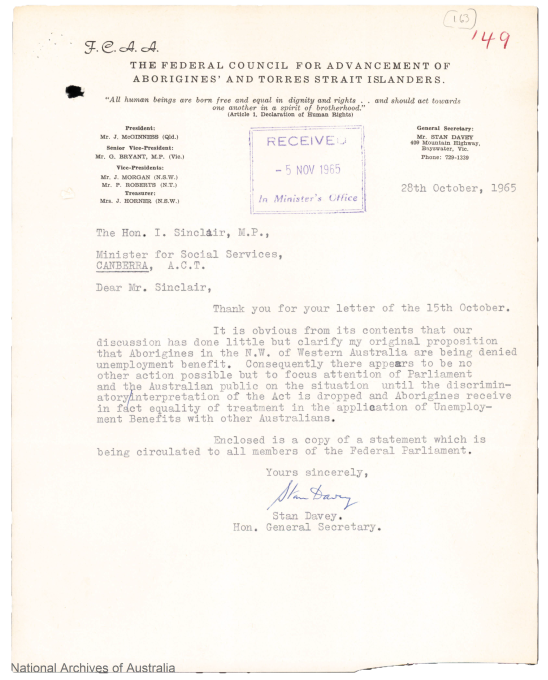
Aboriginal workers forced to accept below-award wages
In 1965, Aboriginal workers paid at below-award rates could not get government payments. The Federal Council for the Advancement of Aborigines and Torres Strait Islanders raised the issue with government, labelling it ‘coercion’ and ‘discrimination’.
the Department accepts a standard of wage rates for Aborigines which are set by employers who ignore awards set by the Arbitration Court applying to other persons in the community ...
| Attachment | Size |
|---|---|
| fcaatsi-davey-mcleod-letters-excerpts.pdf | 2.61 MB |
| Attachment | Size |
|---|---|
| fcaatsi-davey-mcleod-letters-plaintext.docx | 53.93 KB |
By the 1960s, the Social Services Act 1959 meant many Aboriginal people could claim government payments. However, discrimination continued.
To get Unemployment Benefit, people had to prove they had tried to find work. However, in places including Western Australia, Queensland and the Northern Territory, it was legal to pay Aboriginal workers below award rates. Employers paid such low wages that they were less than the amount of an Unemployment Benefit payment.
Aboriginal people who didn’t accept low-wage work were denied payments based on having the opportunity to work in these low-paying jobs. This allowed employers to continue exploiting Aboriginal workers.
These letters from 1965 show the government’s position and activists’ work to question the practice of denying Aboriginal people Unemployment Benefit if they didn’t accept these jobs.
DSS justifies low rates
Non-Aboriginal activist Don McLeod wrote to government officials in late 1964, expressing frustration about the situation faced by Aboriginal workers in the Pilbara region, north Western Australia.
In response, the Director of the Department of Social Services (DSS) in Perth justified the exclusion of Aboriginal people from payments and low wage rates. In a letter to McLeod, the director argued that few ‘natives have the application of the skill to be worth the basic wage’.
DSS officials noted internally that this director’s ‘opinion’ was leading to negative press and ‘charges of discrimination against aborigines’.
FCAATSI applies pressure
Victorian-based Stan Davey of the Federal Council for Advancement of Aborigines and Torres Strait Islanders (FCAATSI) was in regular contact with McLeod. With McLeod’s information, Davey also took up writing to DSS to advocate for Aboriginal people’s access to Unemployment Benefit, as shown in this excerpt.
Davey’s argument was that Aboriginal people were being offered low rates ‘on racial grounds not on measured work ability, as claimed’.
Further, he stated this amounted to a ‘form of coercion’, pointing out people couldn’t get a government payment if they turned down low-paying work.
Government responds to FCAATSI
In Minister for Social Services Ian Sinclair’s response to Davey, he stated that a ‘claimant would be expected to accept an offer of employment’ and that DSS would apply the same rules to everyone ‘irrespective of racial origin’. He did not refer to the wage rate.
In another letter, Sinclair argued that DSS was responsible for neither the welfare of Aboriginal people nor wages policies. This was because Aboriginal people were governed by the states until changes made to the Constitution following the 1967 Referendum.
FCAATSI publishes a statement on the issue
Following this response, Davey circulated a FCAATSI statement to Parliament and the Australian public. The statement brought further attention to the issue and saw it raised in the House of Representatives (HoR 1965:3096).
The FCAATSI statement detailed many issues Aboriginal people faced when dealing with DSS, including:
-
the lack of help for illiterate people applying for Unemployment Benefit
-
state welfare officers neglecting to help Aboriginal people
-
an expectation that Aboriginal people should accept sub-standard wages
-
the Social Service Act’s discrimination against rural workers.
Despite this activism, changes to policy around Unemployment Benefit for Aboriginal workers didn’t come about. Wage inequality continued well after the Pastoral Industry Award wages decision in Western Australia in 1967. In 1967, the West Australian government made a brochure promoting Unemployment Benefit to working Aboriginal men, but in practice most Aboriginal workers remained ineligible for the payment (Jebb 2002:285–9).
McLeod had been living and working with Aboriginal people in the Pilbara area since the late 1930s. In the historic 1946 Pilbara strike, where hundreds of Aboriginal workers walked off stations, McLeod had provided support for the cause. Throughout the 1950s McLeod worked with Aboriginal leaders, many of whom had been strikers, to establish mining cooperatives.
McLeod advocated for Aboriginal people’s rights through public appearances and regular letter-writing to government officials and activists, including to activist Stan Davey.
Davey, led by Sir Pastor Doug Nicholls, co-founded the Victorian Aborigines' Advancement League in 1957. Davey was also active in founding FCAATSI. In the 1970s, Davey and his wife Jan Richardson moved to Western Australia and lived with Aboriginal communities in the Pilbara and Kimberley regions.
Letters from Stan Davey, internal notes about the letters, and copies of replies were kept in a file by the Department of Social Services. The file was later transferred to the National Archives of Australia, which holds it as part of the national archival collection.
You can view these letters through RecordSearch, the online catalogue of the National Archives of Australia. For Davey’s letters, go to pages 154–155, 119, 79–80 and 66–69.
Permissions
Permission to include Stan Davey’s letters was granted by Dr Jan Richardson.
Citation
National Archives of Australia: Department of Social Services; A887, Correspondence files, 1951–1974; D512 Part 1, Aborigines – eligibility for U.S.B. [Unemployment and Sickness Benefit],
1947–1966.
